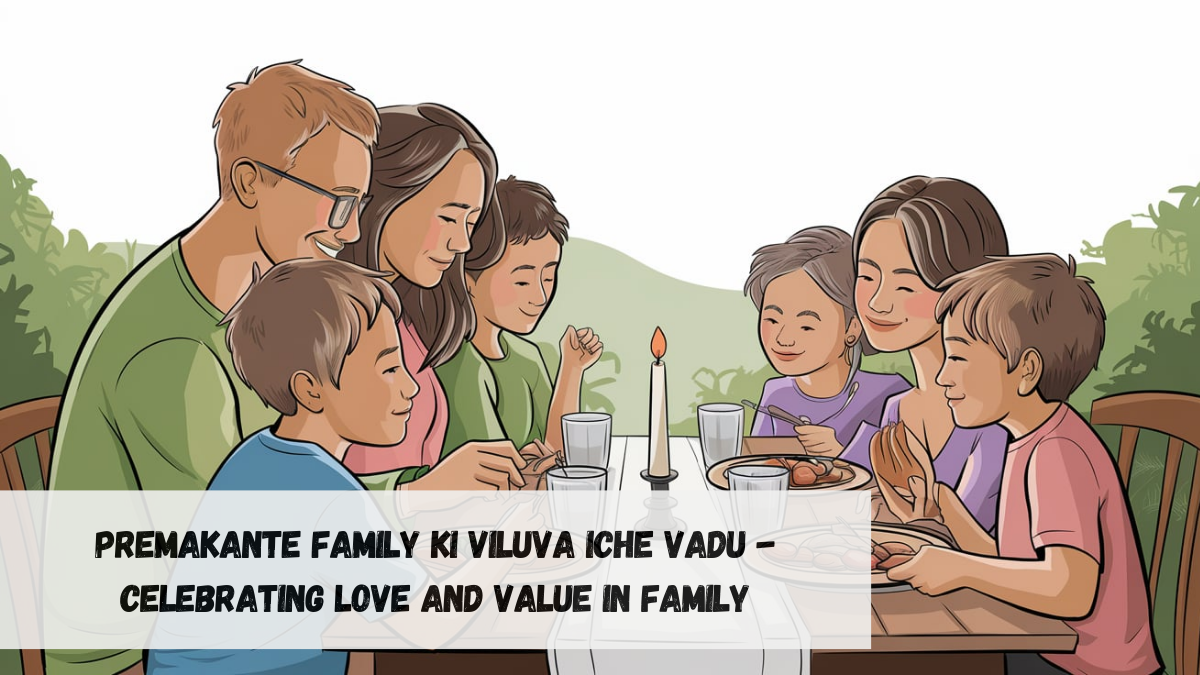Introduction: Premakante Family Ki Viluva Iche Vadu and Its Importance
“Premakante family ki viluva iche vadu,” translated as “he who gives value to the family through love,” is a concept that emphasizes the importance of love, respect, and care within family relationships. In a world that often moves at lightning speed, the values expressed in this phrase remind us of the significance of familial bonds, unconditional support, and the priceless worth of our loved ones. This concept serves as a guiding principle, especially for those striving to create and maintain a happy, harmonious family life.
“Premakante family ki viluva iche vadu” embodies the essence of love and the irreplaceable value that family relationships bring, emphasizing emotional strength, support, and the importance of shared bonds.
In this article, we’ll explore the meaning behind “premakante family ki viluva iche vadu,” its cultural significance, and how applying these values can transform family relationships into strong, lasting bonds. This deep dive will help readers in the USA understand the universal importance of family love and the unique ways it contributes to our happiness.
Chapter 1: Understanding the Meaning of “Premakante Family Ki Viluva Iche Vadu”
“Premakante family ki viluva iche vadu” is much more than a phrase; it’s a philosophy that speaks to the value that love brings to a family. This value isn’t measured in materialistic terms but rather in the way members support, nurture, and uplift one another. Here, we break down what this term means and why it holds so much importance:
- Premakante (Through Love): Love is the foundation of any family. It creates an environment where each member feels safe, valued, and encouraged. Love is a positive force that brings warmth and a sense of belonging.
- Family (Family Ki): The word “family” is inclusive of all relationships built within a household, encompassing grandparents, parents, siblings, children, and even extended relatives. It emphasizes togetherness and unity as essential components of life.
- Viluva (Value): The value spoken of here is not material wealth but the emotional, spiritual, and psychological significance that members bring to each other. It highlights the irreplaceable nature of shared experiences, memories, and support.
- Iche Vadu (The Giver): A family is held together by individuals who contribute to its strength. Those who give love, support, patience, and understanding are the pillars of the family.
Ultimately, “premakante family ki viluva iche vadu” celebrates those who contribute to a family’s well-being and happiness through selfless acts of love and care.
Chapter 2: The Role of Love in Building Family Bonds
The role of love in a family cannot be overstated. It is what transforms a house into a home, making it a place where people feel seen, heard, and loved. Here, we explore some of the ways in which love strengthens familial relationships:
2.1 Love as an Anchor During Difficult Times
Life presents challenges—be it financial hardship, health issues, or personal losses. In times like these, the love between family members becomes an anchor. It provides the emotional strength that helps individuals cope and bounce back. The reassurance of family love means that no one faces challenges alone.
2.2 Encouragement and Motivation
“Premakante family ki viluva iche vadu” also reflects the motivational power of love. Family members motivate each other to grow, whether it’s helping children in school or supporting a partner’s career goals. The encouragement that flows from a loving family environment is irreplaceable.
2.3 Sharing Joy and Celebrations
A family that values love doesn’t just come together during times of hardship; they also share moments of joy and celebration. Whether it’s a birthday, a wedding, or a simple weekend meal, love is what brings everyone together, turning every occasion into a treasured memory.
Chapter 3: Cultural Significance of “Premakante Family Ki Viluva Iche Vadu”
The cultural importance of “premakante family ki viluva iche vadu” stretches across generations and communities. In many cultures, including those in the USA, the concept of giving value to the family through love resonates deeply. Let’s look at how these values play out culturally:
3.1 Family in Different Cultures
In Indian culture, for instance, family ties are highly revered. Joint families are still common in many regions, reflecting the cultural belief in unity and the collective strength that family provides. In the USA, there is also an increasing appreciation for family values, whether it’s spending quality time together during holidays or offering emotional support during challenging times.
3.2 Familial Responsibility
One of the key lessons from “premakante family ki viluva iche vadu” is the idea of responsibility. Every family member plays a role in the family unit. For example, parents bear the responsibility of nurturing and educating their children, while children reciprocate this love by taking care of their parents when they are old. It is about reciprocal love and support, where each person feels that they are giving and receiving.
3.3 The Generational Impact of Love
When family members actively give love, it creates a generational impact. A child who grows up in a loving environment learns to be compassionate, considerate, and emotionally intelligent. These are qualities that they carry into adulthood, passing them on to the next generation.
Chapter 4: Practical Ways to Show Love in the Family
Understanding the value of love in a family is one thing, but putting it into practice is what truly matters. Here are practical ways to embody the spirit of “premakante family ki viluva iche vadu”:
4.1 Effective Communication
Open and honest communication forms the bedrock of a healthy family relationship. Listening without judgment, expressing feelings clearly, and maintaining a supportive attitude towards one another are all ways to nurture love.
4.2 Quality Time Over Quantity
Spending quality time together as a family is crucial. Whether it’s through activities like playing board games, cooking together, or going for walks, these moments create memories that reinforce love and connection.
4.3 Acts of Service
Sometimes, showing love doesn’t require grand gestures. Small acts of service, like cooking a meal, helping with chores, or just lending an ear, go a long way in showing that you care. These acts of kindness build trust and a sense of safety within the family.
4.4 Expressing Gratitude
Expressing gratitude is another way to show love. Whether it’s a thank you note or simply saying “I appreciate you,” these gestures let family members know they are valued. Gratitude strengthens relationships and ensures that everyone feels recognized for their efforts.
4.5 Supporting Emotional Health
Being supportive of one another’s emotional health is a key aspect of giving value through love. Families can create a safe space where individuals feel comfortable sharing their worries, fears, or disappointments, knowing they will be met with understanding and support.
Chapter 5: How “Premakante Family Ki Viluva Iche Vadu” Applies in Modern Times
With the rise of digital communication and the fast pace of modern life, families face unique challenges in staying connected. However, the concept of “premakante family ki viluva iche vadu” remains as relevant today as ever.
5.1 Technology and Staying Connected
Technology has made it easier for families separated by distance to stay connected. Regular video calls, messages, and social media platforms allow family members to keep in touch, share updates, and maintain emotional closeness.
5.2 The Challenges of Modern Life
Modern life often brings its own set of challenges, such as demanding work schedules, which can impact family dynamics. To live by the spirit of “premakante family ki viluva iche vadu,” families must be intentional about prioritizing time with each other, despite these obstacles. This might mean creating specific “family time” that is free from distractions.
5.3 Blended Families and Changing Dynamics
In modern times, blended families have become more common. The philosophy of “premakante family ki viluva iche vadu” is particularly significant here, as it emphasizes acceptance and love for all family members, regardless of biological ties.
Chapter 6: Benefits of Valuing Family Through Love
“Premakante family ki viluva iche vadu” emphasizes the benefits of giving value to the family through love. Let’s look at the advantages of such an approach:
6.1 Emotional Stability and Security
A family that values love provides emotional stability and security. Knowing that there are people who will always stand by you, no matter the circumstances, is incredibly comforting.
6.2 Better Communication Skills
Families that prioritize love tend to communicate better. They develop stronger listening skills and understand each other’s needs better, which contributes to fewer misunderstandings and conflicts.
6.3 Increased Happiness and Wellbeing
The sense of belonging that comes from being part of a loving family contributes significantly to happiness and overall wellbeing. Studies have shown that those who have strong familial bonds are generally happier and healthier.
FAQs: Frequently Asked Questions
1. What does “premakante family ki viluva iche vadu” mean?
“Premakante family ki viluva iche vadu” translates to “he who gives value to the family through love.” It emphasizes the importance of love in creating a supportive and harmonious family environment.
2. How can I give value to my family?
You can give value to your family through love, support, quality time, effective communication, and small acts of kindness. Each gesture contributes to the strength and unity of the family.
3. Why is family love important?
Family love is important because it provides emotional support, security, and happiness. It helps individuals cope with challenges and enhances the overall quality of life.
4. How can we maintain family connections in modern times?
In modern times, technology can be a great way to maintain family connections. Regular communication, shared activities, and setting aside quality family time can also help keep family bonds strong.
Conclusion: The Enduring Legacy of “Premakante Family Ki Viluva Iche Vadu”
The concept of “premakante family ki viluva iche vadu” is timeless. It serves as a reminder that the real wealth of any family lies not in material possessions but in the love, care, and support that each member offers. In today’s world, where individualism is often emphasized, remembering the value of family love is more important than ever.
The lessons from “premakante family ki viluva iche vadu” encourage us to be more loving, more giving, and more present for our families. Whether it’s through small daily gestures, words of encouragement, or simply being there when someone needs you, every act of love adds value to the family. And it is these small acts that make a family not just a group of people living under one roof, but a home full of love, laughter, and cherished memories.




